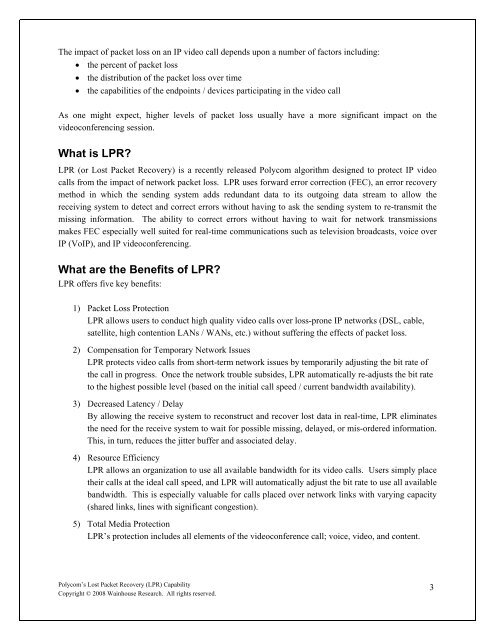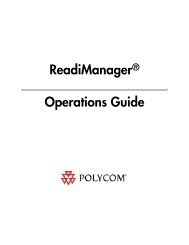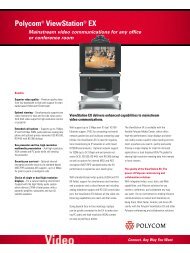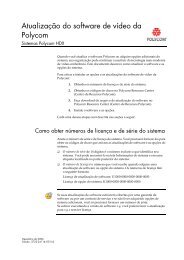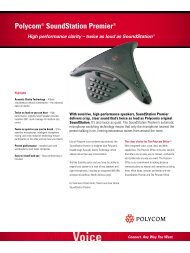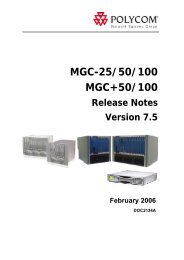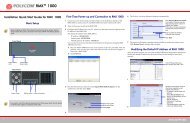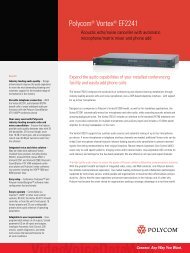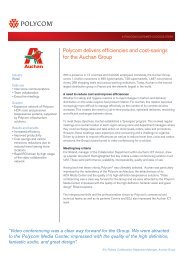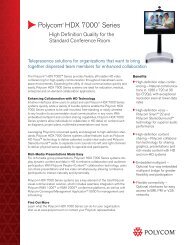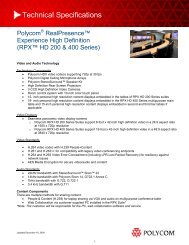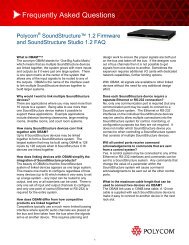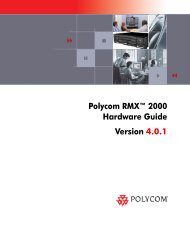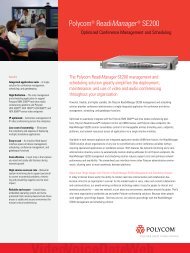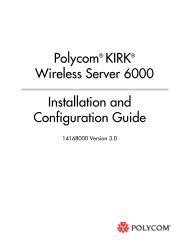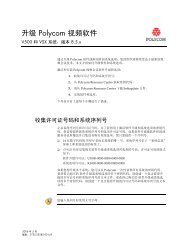Polycom's Lost Packet Recovery - Judge Unified Communications
Polycom's Lost Packet Recovery - Judge Unified Communications
Polycom's Lost Packet Recovery - Judge Unified Communications
You also want an ePaper? Increase the reach of your titles
YUMPU automatically turns print PDFs into web optimized ePapers that Google loves.
The impact of packet loss on an IP video call depends upon a number of factors including:<br />
• the percent of packet loss<br />
• the distribution of the packet loss over time<br />
• the capabilities of the endpoints / devices participating in the video call<br />
As one might expect, higher levels of packet loss usually have a more significant impact on the<br />
videoconferencing session.<br />
What is LPR?<br />
LPR (or <strong>Lost</strong> <strong>Packet</strong> <strong>Recovery</strong>) is a recently released Polycom algorithm designed to protect IP video<br />
calls from the impact of network packet loss. LPR uses forward error correction (FEC), an error recovery<br />
method in which the sending system adds redundant data to its outgoing data stream to allow the<br />
receiving system to detect and correct errors without having to ask the sending system to re-transmit the<br />
missing information. The ability to correct errors without having to wait for network transmissions<br />
makes FEC especially well suited for real-time communications such as television broadcasts, voice over<br />
IP (VoIP), and IP videoconferencing.<br />
What are the Benefits of LPR?<br />
LPR offers five key benefits:<br />
1) <strong>Packet</strong> Loss Protection<br />
LPR allows users to conduct high quality video calls over loss-prone IP networks (DSL, cable,<br />
satellite, high contention LANs / WANs, etc.) without suffering the effects of packet loss.<br />
2) Compensation for Temporary Network Issues<br />
LPR protects video calls from short-term network issues by temporarily adjusting the bit rate of<br />
the call in progress. Once the network trouble subsides, LPR automatically re-adjusts the bit rate<br />
to the highest possible level (based on the initial call speed / current bandwidth availability).<br />
3) Decreased Latency / Delay<br />
By allowing the receive system to reconstruct and recover lost data in real-time, LPR eliminates<br />
the need for the receive system to wait for possible missing, delayed, or mis-ordered information.<br />
This, in turn, reduces the jitter buffer and associated delay.<br />
4) Resource Efficiency<br />
LPR allows an organization to use all available bandwidth for its video calls. Users simply place<br />
their calls at the ideal call speed, and LPR will automatically adjust the bit rate to use all available<br />
bandwidth. This is especially valuable for calls placed over network links with varying capacity<br />
(shared links, lines with significant congestion).<br />
5) Total Media Protection<br />
LPR’s protection includes all elements of the videoconference call; voice, video, and content.<br />
Polycom’s <strong>Lost</strong> <strong>Packet</strong> <strong>Recovery</strong> (LPR) Capability<br />
Copyright © 2008 Wainhouse Research. All rights reserved.<br />
3


